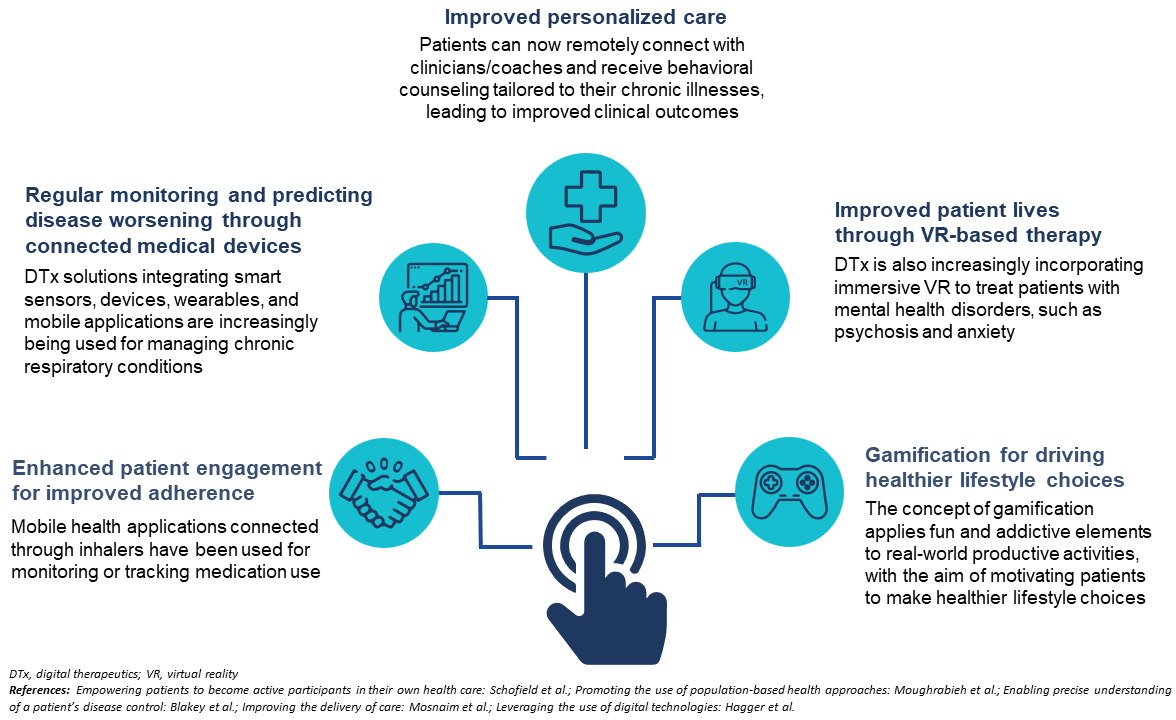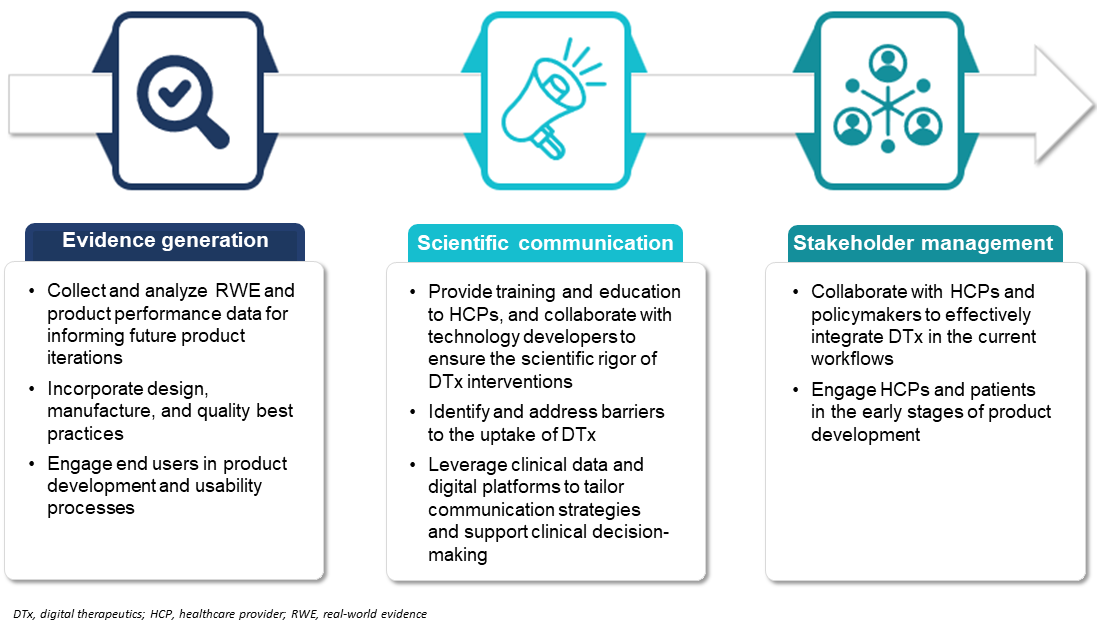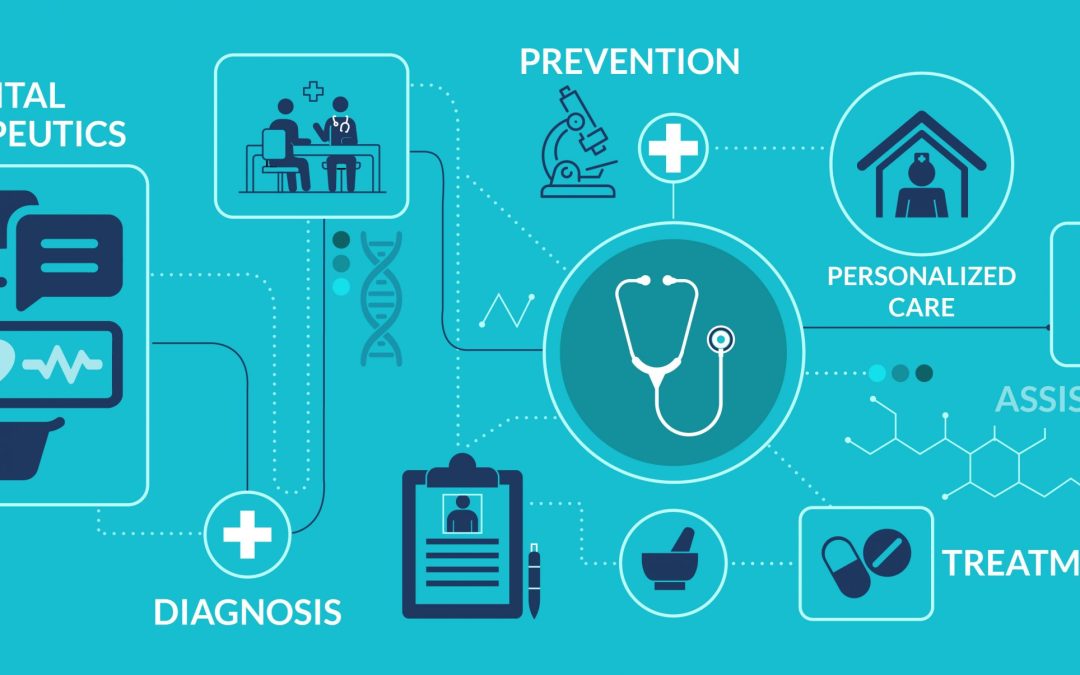The healthcare industry has witnessed a radical shift toward digital solutions that are transforming patient care and disease management. These solutions, known as digital therapeutics (DTx), are designed to create a more personalized experience and enhance education for patients. Unlike traditional pharmaceutical approaches, DTx utilize evidence-based, software-driven therapeutic interventions to prevent, address, manage, and treat medical conditions. DTx interventions can range from cognitive behavioral therapies for mental health disorders to personalized dietary and exercise plans for chronic diseases such as diabetes.
As the global burden of chronic diseases continues to rise, DTx have the potential to monitor the health status of patients remotely, encourage behavioral changes to improve adherence and lifestyle, and offer cost-effective treatments to reduce the burden of preventable complications such as hospitalizations. Health authorities are increasingly recognizing the potential of DTx and encouraging innovation by fostering collaboration among digital health stakeholders with the goal of improving outcomes. For example, the US Food and Drug Administration has created a Digital Health Center of Excellence to empower stakeholders by facilitating strategic partnerships, increasing awareness, and providing clarity on regulation for the development of safe and effective products.
Healthcare services available under DTx complement traditional healthcare delivery and offer the following key benefits (Figure 1):
- Enhanced patient engagement for improved adherence: The Propeller Health system for chronic respiratory diseases tracks when and how often patients use their inhaled medications. Moreover, Catalia Health has developed a robot that uses artificial intelligence (AI) and psychology modeling to tailor conversations with patients to keep them adherent to their treatment regimen.
- Regular monitoring and predicting disease worsening through connected medical devices: myAirCoach, a home-based monitoring and mobile health system, includes an indoor air quality monitor, a home spirometer, a biosensor, a smart inhaler, and a physical activity tracker. It analyzes collected data to determine which parameters may predict periods of poor asthma disease control, and has proven effective in improving patients’ quality of life and acceptance of the technology in addition to reducing severe exacerbation rates.
- Improved personalized care: DTx solutions provide healthcare providers (HCPs) with real-time data insights to personalize treatments and interventions more effectively. DTx also enable patients to remotely connect with clinicians/coaches and receive behavioral counseling tailored to their chronic illnesses, leading to improved health outcomes. A meta-analysis of digital health interventions for blood pressure management demonstrated that digital counseling, when combined with antihypertensive medical therapy, led to a 50% reduction in systolic blood pressure compared to control groups.
- Improved patient lives through virtual reality-based therapy: Immersive virtual reality (VR) is being used to treat patients with mental health disorders such as psychosis and anxiety by simulating anxiety-provoking situations to reduce fear. The use of such VR-based therapy (gameChange) has been particularly helpful for patients who find it difficult to leave their homes, visit local amenities, or use public transportation.
- Gamification that drives healthier lifestyle choices: Discovery, a health insurance company based in South Africa, motivates its members to embrace healthier habits by utilizing its behavioral change initiative known as Vitality, which uses data analytics to obtain patient adherence information and provides rewards and incentives to promote the adoption of healthier lifestyle choices.
Figure 1. Key Benefits of DTx

As technology continues to advance, the integration of AI, machine learning, and data analytics will lead to further breakthroughs in the development and delivery of personalized interventions. However, several challenges must be addressed to unlock the full potential of DTx:
- Regulatory: The regulatory framework needs to evolve to accommodate these novel interventions, ensuring patient safety and efficacy while addressing concerns related to data privacy and security. The digital divide, where certain populations lack access to technology, needs to be overcome to ensure equitable healthcare delivery.
- DTx reimbursement: Payer reimbursement represents a key milestone in the commercial success of a therapeutic intervention. Therefore, DTx developers must proactively engage and address payer concerns related to reimbursement by demonstrating the true value of the intervention in reducing healthcare costs and complications.
- Uptake of DTx solutions: The widespread adoption of DTx solutions by care provider organizations is currently lacking, likely due to the workload burden or poor understanding of the scope, uses, and benefits of DTx. This underscores the need to improve HCP awareness and patient ability to engage with technology, as well as procedures and processes for efficiently integrating DTx into workflows.
Rapid advancements in digital technologies are now disrupting multiple sectors, many of which are ahead of the pharmaceutical industry. To ensure success, the pharmaceutical industry must focus on positioning science and technology as a way to innovate patient journeys and implement evidence-generation strategies to inform interactions with stakeholders and ultimately improve patient outcomes. Medical Affairs is uniquely positioned to achieve these goals and overcome the barriers to DTx uptake. Thus, Medical Affairs must play a proactive role, leading comprehensive evidence generation to support the ability of DTx to optimize patient outcomes and ensuring evidence-based scientific communication that aligns clinical practice with current treatment recommendations to enhance effective stakeholder management (Figure 2).
Figure 2. Role of Medical Affairs in DTx

The digital revolution has brought about a paradigm shift in healthcare, leading to the development and commercialization of several DTx solutions. However, their integration into routine clinical practice will need to be supported by a regulatory framework that facilitates the delivery of evidence-based care and sustained improvements in clinical outcomes. As the healthcare industry continues to embrace technology, it is imperative that the Medical Affairs function fosters collaboration among all stakeholders, including regulators, payers, and providers, to ensure that DTx can fulfill its full potential, positively influence public health, and reshape chronic disease management.
About the author

Praveen Kaul
Associate Medical Director, Publications, Cactus Life Sciences













